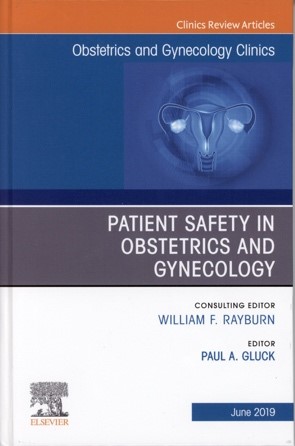Media Release: Pulse Center for Patient Safety Writers Contribute Chapter to Elsevier’s Patient Safety in Obstetrics and Gynecology Journal
Grassroots patient safety organization helps patients’ and advocates’ voices be heard.
The latest edition of the Elsevier journal Obstetrics and Gynecology Clinics of North America (Vol. 46, No. 2, June 2019), titled Patient Safety in Obstetrics and Gynecology, features a chapter called The Patient’s Role in Patient Safety, written by senior staff at Pulse Center for Patient Safety Education & Advocacy.
Long Island-based nonprofit Pulse CPSEA is one of the nation’s leading patient safety education and advocacy groups, with a unique focus on empowering patients and their families to play proactive roles in the health care they receive. Multiple studies have shown that, while medical error is now the third-leading cause of preventable death in the U.S., patients who are informed about and involved with their own care tend to achieve better treatment outcomes.
At the invitation of journal editor Paul A. Gluck MD, Pulse President Ilene Corina, Nurse Practitioner and Adelphi University professor Marissa Abram (PhD, RN, PMHNP-BC) and Pulse Communications Director David Halperin wrote the book’s chapter to explore ideas around the roles that can be played by patients, their families, and patient advocates to minimize risk and protect the rights of the vulnerable.
 Citing numerous real-life stories, they made the case that patient engagement can take place across a broad spectrum: communication, “health literacy”, documentation, opioids and medication management, the “teach-back” method of ensuring comprehension, and more.
Citing numerous real-life stories, they made the case that patient engagement can take place across a broad spectrum: communication, “health literacy”, documentation, opioids and medication management, the “teach-back” method of ensuring comprehension, and more.
The Pulse chapter’s insights were gleaned from years of conducting community training classes, attending patients as advocates at the bedside, and setting up initiatives and organizations (Patient Activation through Community Conversations; The Healthcare Equality Project; A.S.K. for Your Life) to promote sharing of experiences and combat bias in healthcare delivery. As Ilene Corina puts it, “All the work presented in the article comes from best practices that have been proven to work, as simple as they may seem.”
Corina brought to the task decades of experience in patient advocacy and teaching, as well as high-level involvement with healthcare organizations at the national level. Marissa Abram chairs the Pulse Board, and David Halperin is a seasoned journalist who works to spread Pulse’s message to the public.
According to Corina, Pulse CPSEA is different from many other bodies working on patient safety. “Having existed in one form or another since 1996, we have been around longer than most,” she says. “Our firmly patient-centered philosophy is unrelated to the hospital setting and any safety efforts put in place there. We offer a variety of services that people can use, including actual advocacy (always free of charge) and a training workshops.”
One other thing distinguishes Pulse, Corina says. “Educating the community isn’t cheap. Pulse CPSEA is a nonprofit organization. We receive no government funding, and belong to no hospital system. We depend on financial backing from the public and from the generosity of companies and organizations that sponsor a few of our activities. We will be profoundly grateful for any and all support we may receive from those reading this; just as grateful as those patients we can help to get through their medical treatment safely and in good health.”
Please visit https://patientadvocatesinaction.org for more information, and https://patientadvocatesinaction.org/donations to donate.
Or call: (516) 579-4711
To get a copy of the article contact https://www.elsevier.com/
